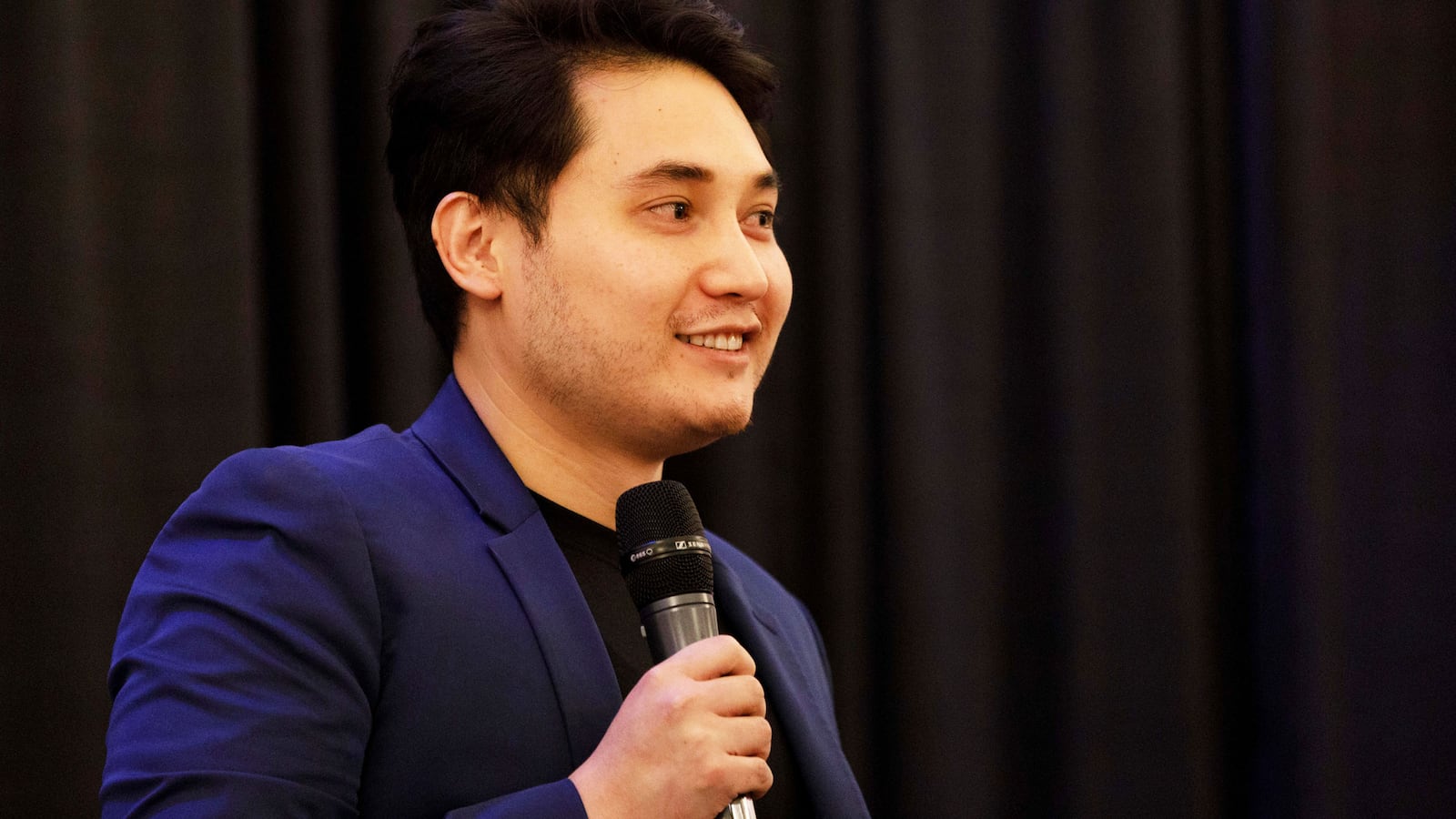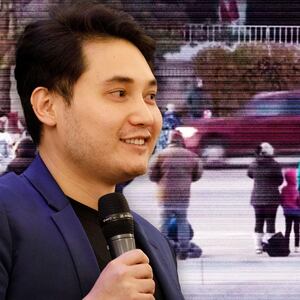UPDATE: On Dec. 21, lawyers representing the plaintiffs withdrew their complaint against Ngô. The case has been dismissed without prejudice.
Right-wing provocateur Andy Ngô has been sued in federal court by two Portland-based photojournalists, alleging he violated copyright law.
In the lawsuit, filed Dec. 8 in the Oregon U.S. District Court, Grace Morgan, 33, and Melissa Lewis, 31, allege Ngô has profited from repeatedly snatching and reposting the original, firsthand videos they shot while covering leftist protests and civil unrest.
They are seeking an injunction to stop him from any future acts of infringement plus $300,000 in compensation for damages, a lawyer representing the pair said.
Morgan and Lewis are far from the only independent reporters and videographers to take issue with Ngô’s social-media aggregation tactics. According to one list compiled by independent researchers, Ngô has been hit with Digital Media Copyright Act (DMCA) takedown notices dozens of times, with many of the claims made in the last 18 months. Morgan alone has had the footage she shot at protests distributed without her permission by Ngô on 38 instances since 2020, she said, and blocking him hasn’t done her or Lewis any good. Nor has it put a stop to the deluge of harassment they’re met with when Ngô repurposes their work.
As Ngô has become the right’s favorite chronicler of left-leaning activists—and, according to his fiercest critics, a propagandist for the far-right—reporting from the field has become a near-impossibility in light of the threats he’s received. In order to keep the steady stream of content flowing, Morgan and Lewis told The Daily Beast, he necessarily relies on footage shot not just by other journalists but activists and bystanders as well. As a media figure, Ngô is well within his rights to comment or share the works of others. But from Morgan and Lewis’ point of view, Ngo has exceeded those boundaries. By grabbing videos wherever he finds them on Twitter, he’s positioning himself as a one-stop news source for urban conflict, whether he’s on the ground or not.
“[Ngô] steals videos from everybody,” said Lewis. Morgan echoed those claims. “[Ngô] has stolen content from a lot of independent journalists from Portland and all over,” she said.
Often, those videos are presented with the context stripped or the truth obscured by Ngô, they claimed, all in the service of a singular goal: pumping out viral-ready content portraying the left as inherently violent and dangerous, a product conservative audiences crave. Filing a lawsuit, then, is not just about putting an end to his alleged theft and subsequent mischaracterizing of their work, both Morgan and Lewis said. They believe they’re taking a stand on behalf of those who lack the means and the time to engage in litigation or can’t afford to put themselves in Ngô's crosshairs. Not when “his audience is so violent,” as Lewis described Ngô’s most rabid admirers.
“Andy [Ngô] is a parasite who is living off the hard work of independent journalists,” Alan Kessler, a Portland copyright attorney representing Morgan and Lewis told The Daily Beast. Despite the frequent allegations of intellectual property theft, Ngô has been able to continue by “using copyright law in extremely cynical ways to shut down his critics… He’s able to weaponize the law.”
Kessler continued: “In this case, Andy is the Goliath,” and Morgan and Lewis are David. Ngô has the personal wealth, the backing of prominent figures on the right, and a seat kept warm for him on Fox News, all of which make litigation a daunting task, even before factoring in the at-times anonymous online trolls willing to take up his cause. Larry Zerner, a Los Angeles copyright and entertainment lawyer also representing Morgan and Lewis, put it more succinctly: “This is about getting him to stop.”
In response to a request sent to Ngô for comment, Harmeet Dhillon, a Republican Party official and lawyer who served as a legal adviser to Trump’s 2020 re-election campaign, expressed confidence that Ngô, her client, would prevail. “This lawsuit is antifa agitprop masquerading as a copyright claim, disconnected from reality both in fact and in law,” she said in an emailed statement. “In a word, this lawsuit is frivolous. These claims are destined to fail—again—and we look forward to that day."
The lawsuit cites two videos that Morgan and Lewis posted to Twitter on Oct. 1, 2021 from protests in Portland and were recirculated with his own particular spin by Ngô a day later.
Twitter’s functions and terms of service allow for the sharing or even embedding of videos posted by other users, which Dhillon noted in her statement. “If U.S. copyright law depended upon whether the creator liked, or wanted critics to review their work, we might as well tear up the First Amendment because no journalist such as Mr. Ngo, would ever be able to critique anything the author didn't want them to,” she added.
And for the most part, Twitter users—reporters or not—don’t take issue with others promoting their work or even offering harsh commentary. But those same terms imposed by Twitter also do not exempt Ngô (or anyone) from the applicable copyright law or revoke ownership of original material, according to the lawsuit. (Soon after The Daily Beast contacted Ngô, he quote-tweeted a videographer’s two-minute clip for the first time in recent memory as opposed to embedding the URL, as he did with the videos produced by Morgan and Lewis. Quote-tweeting wouldn’t be considered a violation of copyright law. On Friday morning, he deleted it and reposted it as an embedded video.)
Enforcing those laws requires no small amount of work. Assuming the complainant spots the alleged theft, they can file a DMCA takedown notice with Twitter. The account in question then is given time to respond with a counterclaim. Should they do so, and if both parties remain at loggerheads, Twitter effectively washes its hands and sends the dispute to the courts. Frequently, this puts whichever is the less deep-pocketed party at a severe disadvantage. Ngô has reportedly availed himself of this right of late too. In October, leftist accounts accused him of filing DMCA notices for posting a photo of him sitting underneath graffiti bearing the name of a fringe far-right antisemitic Polish group.
By Lewis’ estimation, Ngô appropriated her videos “dozens” of times during the height of the protests in 2020 and 2021. At the time, Portland became a fixation among the extremely online right and, in turn, then-President Donald Trump, all of whom regularly painted the city as a hellscape besieged by the menacing left. Ngô was at the forefront of these efforts. Left-of-center movements ranging from Black Lives Matter to antifa have been lumped together as one or deemed “domestic terrorists,” as Ngô said when called to testify before a Senate subcommittee. According to the lawsuit, the act of blocking Ngô should have made it clear to him that neither Morgan nor Lewis had granted him permission to post the videos on his account. Additionally, the block made it impossible for him to scrape the URL without logging out first or using a burner. Filing DMCA notices and tweeted requests for him to stop also had no effect on Ngô’s behavior.
The first time Ngô mentioned Lewis by name on Twitter, on Nov. 2, 2020, he posted a screenshot detailing another, unrelated lawsuit she was involved in–a disability lawsuit—which revealed she was an epileptic and photo-sensitive. Close to two weeks later, several people who she characterized as being on the far-right chased her down during a protest at night and exposed her to strobe lights until she had a seizure. She is confident there’s a direct line between the events and his post.
Morgan, too, has been subjected to all manner of harassment from individuals she believes to be Ngô's fans. She’s received death threats, people have shown up at her place of work and her home, and immediate family members living in other states have been contacted by people she believes are far-right extremists. The harassment, Morgan claims, always pops up in direct correlation with Ngô mentioning her on Twitter. When reporting in the field, she knows she may very well be recognized, largely due to Ngô posting photos of her. On occasion, she’ll hear people shout her name.
All the while, Ngô has benefited from what both Lewis and Morgan characterized as the “dangerous” work being done by others. Lewis has been subjected to beatings by law enforcement, covered actions at an ICE facility, and been exposed to chemicals that cause reproductive health harm “Ngô didn’t have to do any of those things,” she said. “Ngô sat behind a computer and stole my work.”
Oh, and one more note: I was just informed lots of talk radio shows and other "outlets," including @MrAndyNgo, are picking up this video without my permission, spinning it worse than the tires in this thread. To be clear, I've only given two news agencies the green light to share
— Cole Miller (@ColeMillerTV) September 27, 2020
Both Morgan and Lewis stressed that the lawsuit had little to do with money. Neither expects whatever funds they receive, should they win, to cover their legal costs. Barring litigation, Ngô has little incentive to stop reposting content he had no hand in creating. After all, it led to him accumulating close to a million followers on Twitter, frequent TV appearances, glowing praise from Republican politicians, and a best-selling book. The videos he incessantly posts—or the mugshots of leftists, or the videos of people, often people of color, charged with committing apolitical crimes, or the stories he’s been accused of botching—are what have kept Ngô in a position of prominence. His written output, either at right-wing site The Post Millennial or op-eds penned for the New York Post and other right-leaning media companies, can’t compare.
They’re well aware that taking him to court means putting a bigger target on their backs. “Exposing your identity to Ngô is extremely, extremely dangerous,” said Lewis.
There’s a reason no one has been willing to do so until now. “It’s because people are afraid,” she said.







